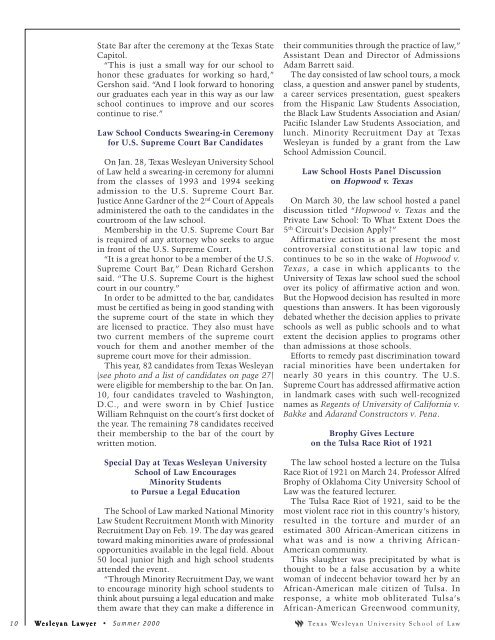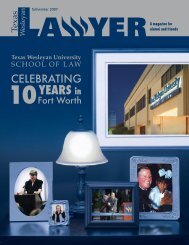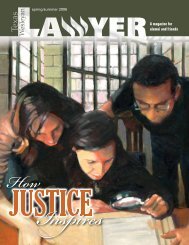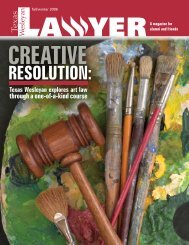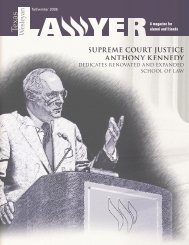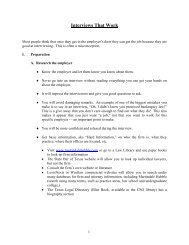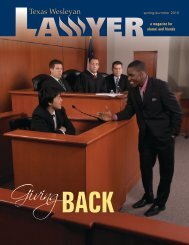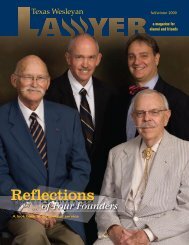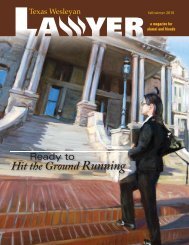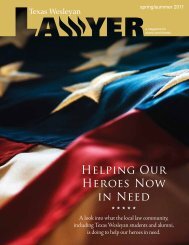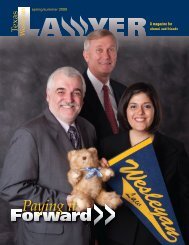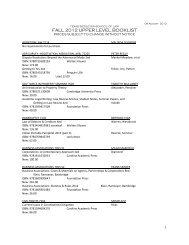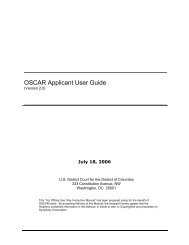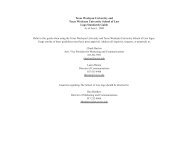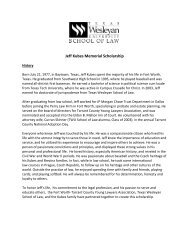21903 TWLS summer2000 - Texas Wesleyan School of Law - Texas ...
21903 TWLS summer2000 - Texas Wesleyan School of Law - Texas ...
21903 TWLS summer2000 - Texas Wesleyan School of Law - Texas ...
You also want an ePaper? Increase the reach of your titles
YUMPU automatically turns print PDFs into web optimized ePapers that Google loves.
State Bar after the ceremony at the <strong>Texas</strong> State<br />
Capitol.<br />
“This is just a small way for our school to<br />
honor these graduates for working so hard,”<br />
Gershon said. “And I look forward to honoring<br />
our graduates each year in this way as our law<br />
school continues to improve and our scores<br />
continue to rise.”<br />
<strong>Law</strong> <strong>School</strong> Conducts Swearing-in Ceremony<br />
for U.S. Supreme Court Bar Candidates<br />
On Jan. 28, <strong>Texas</strong> <strong>Wesleyan</strong> University <strong>School</strong><br />
<strong>of</strong> <strong>Law</strong> held a swearing-in ceremony for alumni<br />
from the classes <strong>of</strong> 1993 and 1994 seeking<br />
admission to the U.S. Supreme Court Bar.<br />
Justice Anne Gardner <strong>of</strong> the 2 nd Court <strong>of</strong> Appeals<br />
administered the oath to the candidates in the<br />
courtroom <strong>of</strong> the law school.<br />
Membership in the U.S. Supreme Court Bar<br />
is required <strong>of</strong> any attorney who seeks to argue<br />
in front <strong>of</strong> the U.S. Supreme Court.<br />
“It is a great honor to be a member <strong>of</strong> the U.S.<br />
Supreme Court Bar,” Dean Richard Gershon<br />
said. “The U.S. Supreme Court is the highest<br />
court in our country.”<br />
In order to be admitted to the bar, candidates<br />
must be certified as being in good standing with<br />
the supreme court <strong>of</strong> the state in which they<br />
are licensed to practice. They also must have<br />
two current members <strong>of</strong> the supreme court<br />
vouch for them and another member <strong>of</strong> the<br />
supreme court move for their admission.<br />
This year, 82 candidates from <strong>Texas</strong> <strong>Wesleyan</strong><br />
(see photo and a list <strong>of</strong> candidates on page 27)<br />
were eligible for membership to the bar. On Jan.<br />
10, four candidates traveled to Washington,<br />
D.C., and were sworn in by Chief Justice<br />
William Rehnquist on the court’s first docket <strong>of</strong><br />
the year. The remaining 78 candidates received<br />
their membership to the bar <strong>of</strong> the court by<br />
written motion.<br />
Special Day at <strong>Texas</strong> <strong>Wesleyan</strong> University<br />
<strong>School</strong> <strong>of</strong> <strong>Law</strong> Encourages<br />
Minority Students<br />
to Pursue a Legal Education<br />
The <strong>School</strong> <strong>of</strong> <strong>Law</strong> marked National Minority<br />
<strong>Law</strong> Student Recruitment Month with Minority<br />
Recruitment Day on Feb. 19. The day was geared<br />
toward making minorities aware <strong>of</strong> pr<strong>of</strong>essional<br />
opportunities available in the legal field. About<br />
50 local junior high and high school students<br />
attended the event.<br />
“Through Minority Recruitment Day, we want<br />
to encourage minority high school students to<br />
think about pursuing a legal education and make<br />
them aware that they can make a difference in<br />
their communities through the practice <strong>of</strong> law,”<br />
Assistant Dean and Director <strong>of</strong> Admissions<br />
Adam Barrett said.<br />
The day consisted <strong>of</strong> law school tours, a mock<br />
class, a question and answer panel by students,<br />
a career services presentation, guest speakers<br />
from the Hispanic <strong>Law</strong> Students Association,<br />
the Black <strong>Law</strong> Students Association and Asian/<br />
Pacific Islander <strong>Law</strong> Students Association, and<br />
lunch. Minority Recruitment Day at <strong>Texas</strong><br />
<strong>Wesleyan</strong> is funded by a grant from the <strong>Law</strong><br />
<strong>School</strong> Admission Council.<br />
<strong>Law</strong> <strong>School</strong> Hosts Panel Discussion<br />
on Hopwood v. <strong>Texas</strong><br />
On March 30, the law school hosted a panel<br />
discussion titled “Hopwood v. <strong>Texas</strong> and the<br />
Private <strong>Law</strong> <strong>School</strong>: To What Extent Does the<br />
5 th Circuit’s Decision Apply?”<br />
Affirmative action is at present the most<br />
controversial constitutional law topic and<br />
continues to be so in the wake <strong>of</strong> Hopwood v.<br />
<strong>Texas</strong>, a case in which applicants to the<br />
University <strong>of</strong> <strong>Texas</strong> law school sued the school<br />
over its policy <strong>of</strong> affirmative action and won.<br />
But the Hopwood decision has resulted in more<br />
questions than answers. It has been vigorously<br />
debated whether the decision applies to private<br />
schools as well as public schools and to what<br />
extent the decision applies to programs other<br />
than admissions at those schools.<br />
Efforts to remedy past discrimination toward<br />
racial minorities have been undertaken for<br />
nearly 30 years in this country. The U.S.<br />
Supreme Court has addressed affirmative action<br />
in landmark cases with such well-recognized<br />
names as Regents <strong>of</strong> University <strong>of</strong> California v.<br />
Bakke and Adarand Constructors v. Pena.<br />
Brophy Gives Lecture<br />
on the Tulsa Race Riot <strong>of</strong> 1921<br />
The law school hosted a lecture on the Tulsa<br />
Race Riot <strong>of</strong> 1921 on March 24. Pr<strong>of</strong>essor Alfred<br />
Brophy <strong>of</strong> Oklahoma City University <strong>School</strong> <strong>of</strong><br />
<strong>Law</strong> was the featured lecturer.<br />
The Tulsa Race Riot <strong>of</strong> 1921, said to be the<br />
most violent race riot in this country’s history,<br />
resulted in the torture and murder <strong>of</strong> an<br />
estimated 300 African-American citizens in<br />
what was and is now a thriving African-<br />
American community.<br />
This slaughter was precipitated by what is<br />
thought to be a false accusation by a white<br />
woman <strong>of</strong> indecent behavior toward her by an<br />
African-American male citizen <strong>of</strong> Tulsa. In<br />
response, a white mob obliterated Tulsa’s<br />
African-American Greenwood community,<br />
10 Wesle esle esley esle an an La <strong>Law</strong>y La wy wyer wy er • Summer 2000 <strong>Texas</strong> <strong>Wesleyan</strong> University <strong>School</strong> <strong>of</strong> <strong>Law</strong>


